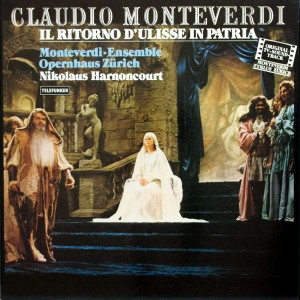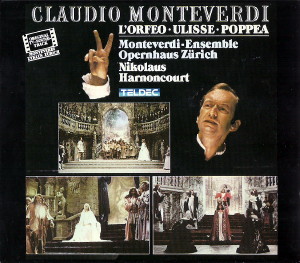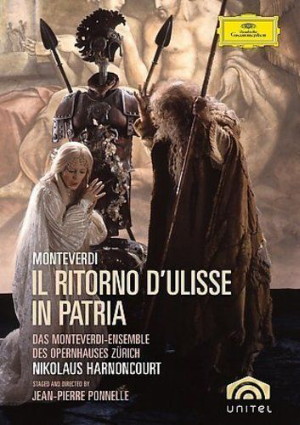 |
3 LP -
6.35592 FK - (p) 1981
|

|
| 6 CD -
8.35807 XB - (c) 1988 |
 |
| 2 DVD -
0440 073 4268 8 - (c) 2007 |
|
Claudio
Monteverdi (1567-1643)
|
|
|
|
|
|
|
|
| Il Ritorno d'Ulisse in Patria |
|
|
|
|
|
|
|
Prologo
|
|
9' 19" |
|
| - L'humana fragilità, Tempo,
Fortuna, Amore |
9' 19" |
|
A1 |
| Atto Primo |
|
51' 47" |
|
| - Scena I: Penelope, Ericlea |
7' 45" |
|
A2 |
| - Scena II: Melanto, Eurimaco |
9' 25" |
|
A3 |
| - Scena V: Nettuno, Giove |
7' 31" |
|
B1 |
| - Scena VI: Coro di Feaci,
Nettuno |
2' 57" |
|
B2 |
| - Scena VII: Ulisse |
3' 45" |
|
B3 |
| - Scena VIII: Minerva, Ulisse |
8' 29" |
|
B4 |
| - Scena IX: Minerva, Ulisse |
1' 42" |
|
B5 |
| - Scena X: Penelope, Melanto |
3' 39" |
|
C1 |
| - Scena XI: Eumete |
0' 55" |
|
C2 |
| - Scena XII: Iro, Eumete |
2' 19" |
|
C3 |
| - Scena XIII: Eumete, Ulisse |
3' 22" |
|
C4 |
| Atto Secondo |
|
52' 41" |
|
| - Scena I: Telemaco. Minerva |
2' 28" |
|
C5 |
| - Scena II: Eumete, Ulisse,
Telemaco |
4' 38" |
|
C6 |
| - Scena III: Telemaco, Ulisse |
3' 44" |
|
C7 |
| - Scena IV: Melanto, Eurimaco |
2' 06" |
|
C8 |
| - Scena V: Antinoo, Anfinomo,
Pisandro, Eurimaco,, Penelope |
8' 30" |
|
D1 |
| - Balletto |
5' 16" |
|
D2 |
| - Scena VII: Eumete e Penelope |
1' 13" |
|
D3 |
| - Scena VIII: Antinoo, Anfinomo,
Pisandro, Eurimaco |
4' 33" |
|
D4 |
| - Scena XII: Antinoo, Eumete,
Iro, Ulisse, Telemaco, Penelope, Pisandro,
Anfinomo |
11' 22" |
|
D5 |
| - Scena XII (cont.): Antinoo,
Eumete, Iro, Ulisse, Telemaco, Penelope,
Pisandro, Anfinomo |
9' 01" |
|
E1 |
| Atto Terzo |
|
35' 36" |
|
| - Scena I: Iro |
8' 18" |
|
E2 |
| - Scena III: Melanto, Penelope |
1' 07" |
|
E3 |
| - Scena IV: Eumete e detti |
2' 00" |
|
E4 |
| - Scena V: Telemaco e detti |
1' 08" |
|
E5 |
| - Scena VI: Minerva, Giunone |
1' 58" |
|
E6 |
| - Scena VII: Giunone, Giove,
Nettuno, Minerva e Coro di celesti |
6' 08" |
|
F1 |
| - Scena VIII: Ericlea |
3' 54" |
|
F2 |
| - Scena IX: Penelope, Telemaco,
Eumete |
0' 55" |
|
F3 |
| - Scena X: Ulisse e detti |
10' 08" |
|
F4 |
|
|
|
|
Werner
Hollweg, L'humana
fragilità, Ulisse
|
Arley
Reece, Iro |
|
Werner
Gröschel, Tempo, Coro
marittimo, Feace
|
Janet
Perry, Melanto, Coro in
cielo
|
|
Renate
Lenhart, Fortuna, Giunone
|
Maria
Minetto, Ericlea |
|
Klaus
Brettschneider (Tölzer
Knabenchores), Amore
|
Philippe
Huttenlocher, Eumete |
|
|
Jozsef
Dene, Giove |
|
| Trudeliese
Schmidt, Penelope |
Hans
Franzen, Nettuno |
|
| Francisco
Araiza, Telemaco |
Helrun
Gardow, Minerva |
|
| Simone
Estes, Antinoo |
Suzanne
Calabro, Coro in cielo |
|
Peter
Straka, Pisandro, Coro
marittimo
|
Christina
Grossniklaus, Coro in
cielo |
|
Paul
Esswood, Anfinomo, Coro
marittimo, Feace
|
Arley
Reece, Coro marittimo |
|
Peter
Keller, Eurimaco, Coro in
cielo
|
Fritz
Peter, Feace |
|
|
|
Monteverdi-Ensemble
Opernaus Zürich
|
|
|
|
| Nikolaus
Harnoncourt, Gesamtleitung |
|
|
Luogo e data
di registrazione
|
Neue Kirche
Altstetten & Neuw Kirche
Albisrieden, Zurigo (Svizzera)
- febbraio 1979
|
|
Registrazione
live / studio
|
| studio |
Producer / Engineer
|
Original Soundtrack Unitel
Film & TV Production
|
Prima Edizione
CD
|
Teldec - 8.35807 XB - (6
cd) - 70' 04" + 70' 56" + 64' 22" + 72'
24" + 69' 23" + 62' 18" - (c) 1988 - AAD
|
Prima
Edizione LP
|
Telefunken - 6.35592 FK - (3
lp) - 50' 53" + 54' 00" + 44' 37" - (p)
1981
|
Edizione DVD
|
| Deutsche Grammophon - 0440 073
4268 8 - (2 dvd) - 116" 00" + 37' 00" -
(c) 2007 - (IT) GB-DE-FR-SP-CH |
|
|
IL RITORNO D'ULISSE IN
PATRIA
|
"Il Ritorno
d'Ulisse in Patria" is one of
Monterdi's late works.
Composed in 1641 for Venice and
Bologna, this opera nevertheless
cannot be counted as one
of the Baroque operas which actually
became fashionable a little later, the
concept of which pushed the course of
dramatic action into the background in
favour of stage effects and of certain
star soloists. In this respect
“Ulisse” can be regarded as an early
Baroque, or even a Renaissance-type
work. - In the prologue, “Human
Frailty” sings of its dependency upon
fate, love and transitoriness. -
Penelope and her old nurse Euryclea
bemoan her sad fate and plead for the
retun of Odysseus. - Urged on by her
lover Eurimaco, the maid Melanto
tries, in league with the suitors, to
make her mistress Penelope change
her mind. - Thanks to Pallas Athene
and the Phaeacians, Odysseus is able
once more to retun to his homeland.
They have outwitted Poseidon who is
trying to prevent the retun home of
the Greek heroes who had fought in the
Trojan war. In a fit of rage he
punishes the Phaeacians by turning
them into stone. - Odysseus awakes on
the coast of Ithaca and thinks that he
has been deserted and betrayed by the
Phaeacians. He meets Athene, who
is disguised as a shepherd boy and who
explains his mistake and requests him
to obey her orders. Disguised as a
beggar, Odysseus makes his way
to the palace, to Penelope and the
suitors. En route he encounters the
old swineherd Eumete, who has remained
loyal to him. The “beggar” tells him
of the imminent return of Odysseus; he
then reveals himself to his son
Telemaco, who has just returned from a
journey to Sparta where,
protected by Athene, he wanted
to obtain further information about
his father from Helen. - At the palace
the suitors are trying to enliven
Penelope’s mood with a ballet, and
they urge her to take one of them as
her husband. When Eumete announces the
arrival of Odysseus and the return of
Telemaco, the suitors decide to kill
Telemaco and force Penelope to do what
they want before her
husband returns. - Eumete
annoys the suitors by bringing into
the palace a beggar, Odysseus in
disguise; but when the latter beats
the gluttonous parasite Iro in a
wrestling match he is allowed to
remain. The suitors lay presents at
Penelope’s feet, and she sees only one
way of protecting herself against
their advances - or enabling a
decision to be taken. Whoever can draw
the bow of Odysseus may take her for
his wife. None of them succeeds in the
test, and Odysseus asks that he might
try his strength, renouncing the
prize. Still disguised as a beggar he
draws the bow and kills the suitors. -
Iro mourns the loss of the suitors and
his easy, well-fed style of life and
kills himself. - Hera and Athene ask
Zeus for peace for Odysseus. Poseidon
is placated and thus nothing stands in
the way of a happy ending. - Ericlea
has recognized by a scar that the
beggar is Odysseus; she now considers
whether she may speak or, at Odysseus
request, must remain silent. - It is
difficult to convince Penelope that
the beggar, restored to his proper
appearance by Athene, is her husband
Odysseus. She does not wish
to be conquered by magic tricks.
However, when Odysseus describes the
patterned coverlet with which she once
decorated her bed, and which nobody
else but he has seen, Penelope is
finally able to accept her happiness.
|
|
Nikolaus
Harnoncourt (1929-2016)
|

|

|
|